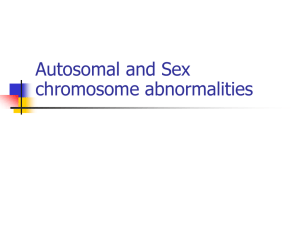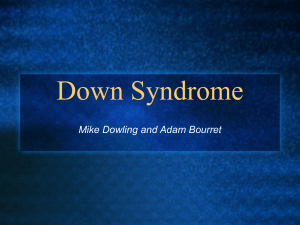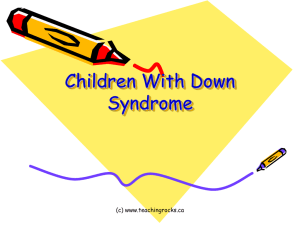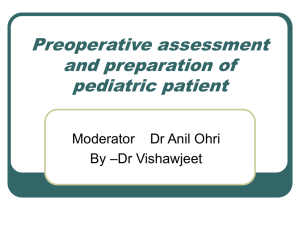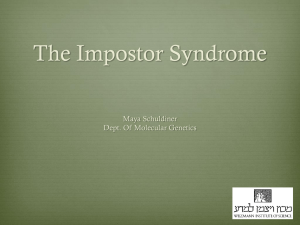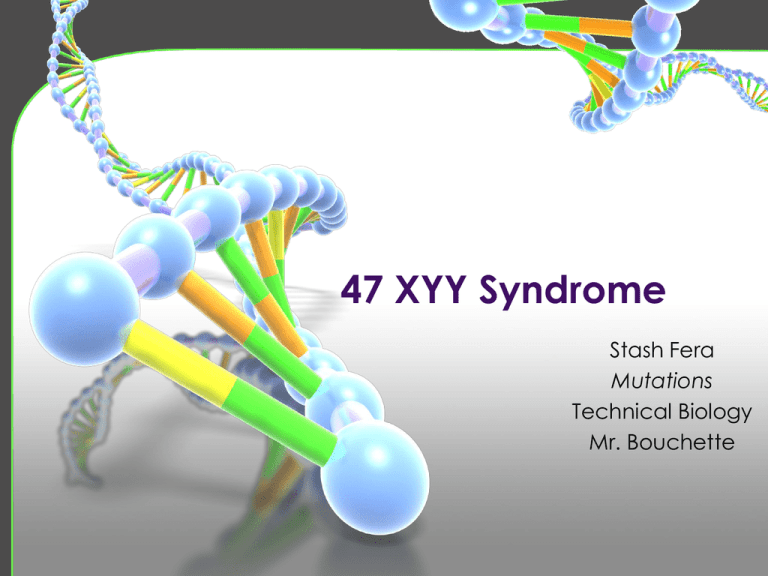
47 XYY Syndrome
Stash Fera
Mutations
Technical Biology
Mr. Bouchette
•Summary Layout
47 XYY Syndrome
What Is 47 XYY Syndrome?
Introduction
What tests can be done to detect 47 XYY Syndrome?
Diagnosis
Symptoms
Treatment
Prognosis
What are the signs that indicate you have 47 XYY
Syndrome?
What treatment plans are available to treat 47 XYY
Syndrome?
What is the outcome for people with 47 XYY
Syndrome?
•Introduction
47 XYY Syndrome
Definition of XYY Syndrome
According to the Stedman’s Medical Dictionary XYY Syndrome is a
chromosomal abnormality characterized by the occurrence of one X-chromosome and two Ychromosomes.
Description
The XYY syndrome was in the past was considered the super-male syndrome. Men with this
condition were thought to be overly hostile and more likely to become criminals. These original
conceptions came about because several researchers in the 1960s found a high number of
men with XYY syndrome in prisons and mental facilities. Based on these findings, men with
XYY syndrome were labeled as overly aggressive and likely to be criminals.
The original observations did not take into consideration that the majority of males with XYY
syndrome were not in prisons or mental institutes. Since then, less biased studies have been
done on males with XYY syndrome. Sadly, some text books and many people still believe the
incorrect stereotype of the super-male syndrome.
•Introduction
47 XYY Syndrome
Genetic Profile
Chromosomes are structures in the cells that contain genes. Genes are responsible for telling our bodies how
to grow and develop. As a rule, an individual person has 46 chromosomes in his or her cells, which would be 23
pairs. The first 22 pairs are the same in males and females. The last pair, which are the sex chromosomes,
consist of two X chromosomes in a female, and an X chromosome and a Y chromosome in a male.
XYY syndrome occurs when an extra Y chromosome is present in the cells of an affected individual. People
with XYY syndrome are always male. The fault that causes the extra Y chromosome can occur in the fertilizing
sperm or in the developing embryo.
XYY is not considered a heredity condition. An inherited condition usually is one in which either the mother or
father has an variation in a gene on chromosome that can be passed onto their children. Typically, in an
inherited condition, there is an increased chance that the condition will happen again. The possibility of the
condition reoccurring in another pregnancy is not increased above the general population incidence.
Demographics
YY syndrome has an incidence of one in 1,000 newborn males. However, since many males with XYY
syndrome look like other males without XYY syndrome, many males are never identified.
•Symptoms
47 XYY Syndrome
List of Symptoms
(mentioned in various sources)
•
Tall stature
•
Learning disability
•
Delayed speech
•
Delayed language skills
•
Developmental delays
•
Behavioral problems
•
Large teeth
•
Weakness
•
Poor fine motor coordination
•
Prominent glabella
•
Asymmetrical face
•
Long ears
•
Sunken chest
•
Severe adolescent nodulocystic acne
•Treatment
47 XYY Syndrome
Treatment for 47 XYY
The treatment and management for most men with XYY syndrome is not indicated. Though, early detection
and involvement of learning disabilities and behavior difficulties is necessary.
Speech therapy, physical therapy, and occupational therapy may be supportive for males with XYY syndrome.
Males with XYY syndrome are at danger in hectic environments. That is why a supportive and stimulating home
life is important.
•Prognosis
47 XYY Syndrome
Prognosis for 47 XYY
Most males who have learning disabilities and/or behavior problems due to XYY syndrome
have an excellent prognosis. Learning disabilities are mild and the most affected males learn
how to control their impulsiveness and other behavior problems. XYY syndrome does not
shorten lifespan.
Karyotype from a male with 47 XYY
•References
•
•
•
XYY syndrome. Dictionary.com. The
American Heritage® Stedman's Medical
Dictionary. Houghton Mifflin
Company.http://dictionary.reference.com/bro
wse/XYY syndrome (accessed: February 21,
2011).
Carin Lea Beltz, MS. "XYY Syndrome."
2002. Healthline: Connect to a Better
Health. 20 February 2011
<http://www.healthline.com/galeconten
t/xyy-syndrome>.


